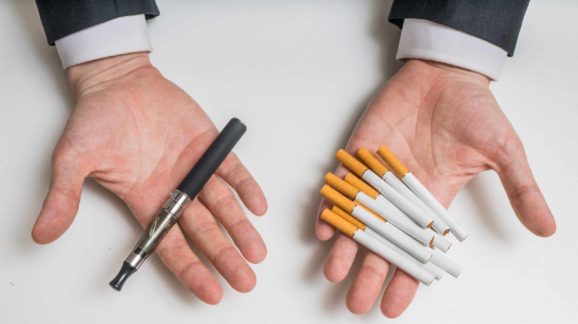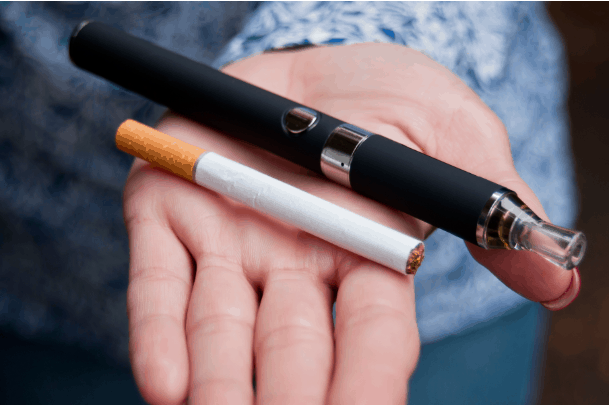If You Vape (Illicit Street Drugs), It May Kill You (Duh)

 Over the last four weeks, eight Wisconsin teenagers have been hospitalized with severe lung damage. The news that vaping caused these illnesses has swept across social media and is, predictably, being used to push for more government restrictions on e-cigarettes. But, what few of these reports have pointed out is that it seems most—if not all—of the hospitalizations were related, not to e-cigarettes, but illicit “street vapes.” If e-cigarettes are banned or restricted we can expect to see more stories like this as people increasingly turn to the black market.
Over the last four weeks, eight Wisconsin teenagers have been hospitalized with severe lung damage. The news that vaping caused these illnesses has swept across social media and is, predictably, being used to push for more government restrictions on e-cigarettes. But, what few of these reports have pointed out is that it seems most—if not all—of the hospitalizations were related, not to e-cigarettes, but illicit “street vapes.” If e-cigarettes are banned or restricted we can expect to see more stories like this as people increasingly turn to the black market.
“If you vape, it may kill you” proclaims one local television reporter just after his colleague calls the story out of Wisconsin a warning “for anyone who vapes.” According to the Children’s Hospital of Wisconsin, the only common thread between the eight teens who were admitted with severe lung damage was that they all reported vaping. Given that over-the-counter e-cigarettes are enjoyed by millions of adults, it certainly would be a big story if they suddenly started landing people in the hospital. But a very important detail, revealed in only a handful of reports on this story, is that “some of the teenagers reported buying vaping products, including nicotine and THC, on the black market.” And street vapes, though they have “vape” in the name, are not e-cigarettes.
Street Vapes Are NOT E-cigarettes
Counterfeit weed vaporizers have been a known danger for many years. Often produced in China, these devices are mainly used by minors (who can’t legally obtain cannabis) or in places where weed isn’t yet legal for adult use. Though they are made to look like legitimate THC vaporizers, which heat up a solution of cannabis oil, these street vapes often contain other—more harmful—substances.
Last year, health officials in Manchester, UK warned the public about the dangers of black market vapes after nine people were admitted to the hospital. Instead of all-natural THC oil, the street vapes actually contained “spice,” a dangerous mixture of herbs and chemicals. In the same month, the U.S. Food and Drug Administration (FDA) put out an alert that people had been hospitalized or died after using illegal street vapes laced with rat poison.
At this moment, it’s unclear exactly what kinds of vape the Wisconsin teens had used. But, it seems highly likely that most, if not all, were using black market devices. For the last ten years, vaping has enjoyed relative popularity in the U.S., with millions of adult users, and there has not been a single story of acute lung damage like this associated with legal e-cigarettes. In fact, in the UK, where e-cigarette use is encouraged for smokers, the National Health Service is considering a policy that would allow vaping indoors at all hospitals.
Bans and Black Markets Are to Blame
Though journalists have mostly ignored this fundamental detail, they are not wrong about the Wisconsin story being a cautionary tale. But the caution should not be about e-cigarettes—it’s a warning about the dangers of prohibition.
Whether it was a THC “spice” product or just a knockoff nicotine vape, the only reason these people turned to the black market was because they couldn’t acquire cannabis or e-cigarettes legally. Black markets only arise when products are unavailable or prohibitively expensive on the legal market, often as a result of well-meaning efforts to protect people from their own choices. But instead of keeping them away from substances that might increase their risks a little, restrictions push people into the illicit market where adulterated and defective products can kill them. It is a story we’ve seen over and over again around the world:
- Tainted bootleg liquor constantly results in deaths in places where alcohol is banned, restricted, or prohibitively expensive.
- Opioids, though dangerous in their own right, become even more deadly when addicts turn to the black market and use the cheaper, fentanyl- or heroin-laced versions.
- And, as discussed, those who turn to the black market to purchase cannabis products often unwittingly consume “spice” or even rat poison and die or are severely injured.
For years now, anti-vaping advocates have demanded bans and severe restrictions on e-cigarettes. Unsurprisingly, they’re already using the Wisconsin story to fuel their propaganda about vaping causing an “epidemic” of teen nicotine use. Even if there was an epidemic of youth vaping (spoiler alert: there isn’t) it would not justify banning e-cigarettes which have already helped millions of adults kick their deadly smoking habit. All that bans, increased taxes, and restrictions will accomplish is pushing adolescents and adults turning toward homemade or black-market products. If that happens, expect to see more poisonings, more tainted vapes, and more exploding e-cigarettes. Even worse, we can expect to see more teens choosing to smoke traditional cigarettes and more adults returning to smoking. Given that traditional cigarettes kill half of their users, I don’t see how any of these outcomes would be considered good for public health.